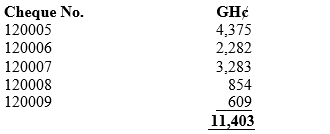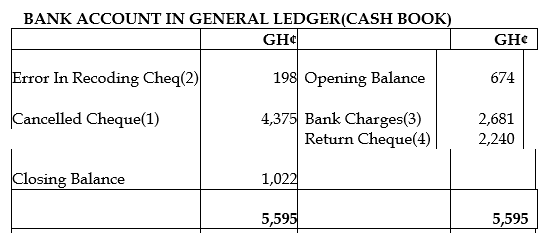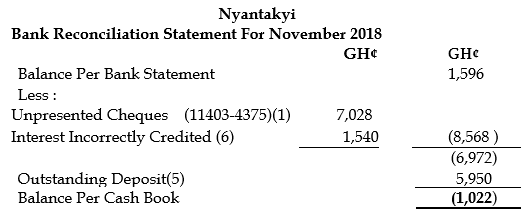Nov 2016 Q2
Mr. Bossman bought a Nissan diesel vehicle from Trans Africa Engineering and Motor Co. Ltd. However, when the vehicle broke down, Mr, Bossman did not go to the dealers for spare parts, but rather went to Messrs Jones Williams &Co, and through one of its directors, placed an order for the spare parts from Japan. The order was placed for the spare parts with TSS Co. Ltd, and by Telex, headed “we quote for Japan”, TSS Co Ltd, supplied Jones Williams & Co. with the requisite quotation, and that the spare parts would be delivered in three (3) months’ time. Mr. Bossman then got his foreign bankers to transfer the amount, being the cost of the spare parts to the bankers of Messrs Jones Williams & Co. Ltd, who in turn, paid the amount to the suppliers. When the spare parts were not forthcoming, Mr. Bossman sued Messrs Jones Williams & Co for the return of his money, interest and damages. Before the court case started, Mr. Bossman received the spare parts, and therefore had to abandon his claims.
Required:
a) Explain the following in terms of the provisions of the Sale of Goods Act, 1962 (Act 137):
i) The relationship between Mr. Bossman and Messrs Jones Williams & co. Ltd. (3 marks)
View Solution
one of agency and not of sale of goods.
In the instant case Messrs Jones Williams &Co Ltd never delivered to Mr. Bossman a pro-forma invoice of its own stating the price at which it would sell the spare parts to Mr. Bossman or the time it would deliver the goods.
All that Messrs Jones Williams & Co, Ltd did was to give Mr. Bossman a copy of the telex from the suppliers, and asked him to pay for the cost of the spare parts calculated from the unit prices.
The obligation that Messrs Jones Williams & Co Ltd assumed towards, Mr. Bossman was that of using its best endeavors to procure the goods for him on the most favourable terms, and was not responsible for the delay.
ii) The relationship between TSS Co. Ltd and Messrs Jones Williams &CO. Ltd. (3 marks)
View Solution
when the TSS Company Ltd agreed to procure the goods for Messrs Jones Williams and Co. Ltd, TSS Co. Ltd did that as the agent of Messrs Jones Williams Co. Ltd, or as a principal party standing towards Messrs Jones Williams Co. Ltd in the relationship of a seller.
The contract between the supplier TSS Co. Ltd and Jones Williams and Co. Ltd was of the type in commercial circles knows as Free on Board(FOB) contract. By the rules of FOB Contracts, the supplier assumed the responsibility for shipping the goods to the buyer. In this case TSS Co Ltd, the supplier was to ship the spare parts to James Williams and Co. Ltd. (See section 62 of Act 137).
The seller TSS Co. Ltd, assumed no responsibility for insurance or freight nor did it give guarantees as to the time of the arrival of the ship at its destination.
The only representation which TSS Co. Ltd made was that it was ready and willing and able to deliver the goods (spare parts within three(3) months to any part in Japan nominated by James Williams and CO. Ltd and load them at their own expense on the ship designated by them ( Messrs Jones Williams & Co. Ltd).
b) Identify FOUR differences each between Free On board (FOB) contracts and Cost, Insurance, Freight (CIF) contracts.
(8 marks)
View Solution
The rule of FOB contract in section 62 of Act 137 states as follows:
- Buyer entitled and bound to nominate a ship to the seller calling during the agreed period.
- The seller is bound at his own expense, to have the good on the ship nominated by the buyer.
- The seller is bound at his own expense, to give such notice to the buyer.
- The seller is not bound to effect any insurance on the goods.
- The seller is bound to transmit to the buyer bills of lading by which the goods are deliverable to the buyer.
- The risk of the goods passes to the buyer when they are shipped.
Cost, Insurance and Freight (CIF) contracts.
- Seller is bound at his own expense to ship the goods during the period, if any, to the port agreed upon or to acquire goods afloat which have been so shipped.
- The seller is bound, at his own expense, to effect on the goods an insurance of the type normal for goods and voyage of the kind in question;
- The seller is bound to transfer to the buyer proper shipping documents in accordance with terms of the contract;
- The buyer is bound to take up proper shipping documents and, on doing so, to pay the price in accordance with the terms of the contract;
- The goods are deemed to be delivered to the buyer, and the property therein accordingly passes to the buyers, on the transfer to him of the bills of lading;
- The risk in the goods passes to the buyer when they are shipped or acquired afloat.
c) Orlando Motors, an American Automobile Company, paid for three (3) cars and consigned them to Mr. Kobby Ayensu in Ghana by a bill of lading; vehicle No. GTB 7084 was one of the three (3) cars, Mr. Kobby Ayensu, as the consignee, took delivery of the vehicles and registered vehicle No. GTB 7084. He later sold the vehicle he registered to Tracy Achiaa. The appropriate change of ownership was then effected. Later, one Mr. Oko Lartey who was claiming interest in the cars, sued Mr. Kobby Ayensu in respect of the cars and immediately went to court and obtained an order resulting in the impounding of the vehicle from Tracy Achiaa.
Required:
Explain whether there is any legal basis for Tracy Achiaa to take action to recover the impounded vehicle. (6 marks)
View Solution
- Tracy Achiaa was a bonafide purchaser for value without notice under the provisions of the Sale of goods Act, 1962, Act 137, and, therefore, had a legal interest in the vehicle.By the provisions of Section 26 of the Act 137, property in the vehicle had passed to her.
- Even if under an agreement between Mr. Oko and Mr. Kobby Ayensu, Mr. Ayensu could be regarded as a mere agent of Mr. Oko, and as a mercantile agent in possession, Mr. Ayensu could, under Section 30 of Act 137, validly dispose of the vehicle to Tracy Achia.
- The vehicle was shipped to Mr. Kobby Ayensu by Olando motors Ltd. as a consignor, and Mr. Kobby Ayensu as a consignee. That by the bill of lading, Mr. Kobby Ayensu was the owner of the vehicle, as proclaimed to the whole world, and therefore. Tracy Achiaa validly acquired the vehicle from Mr. Ayensu, under a contract of sale which passed on valid title in the vehicle to her. And that Tracy Achiaa is, therefore protected, on the face of it all by Act 137.



